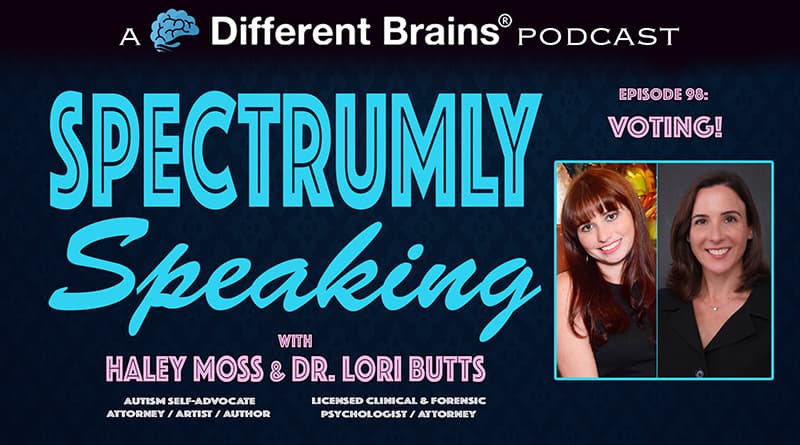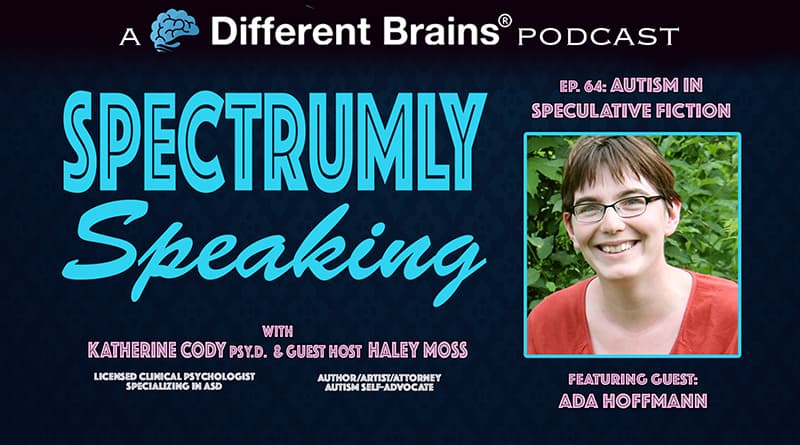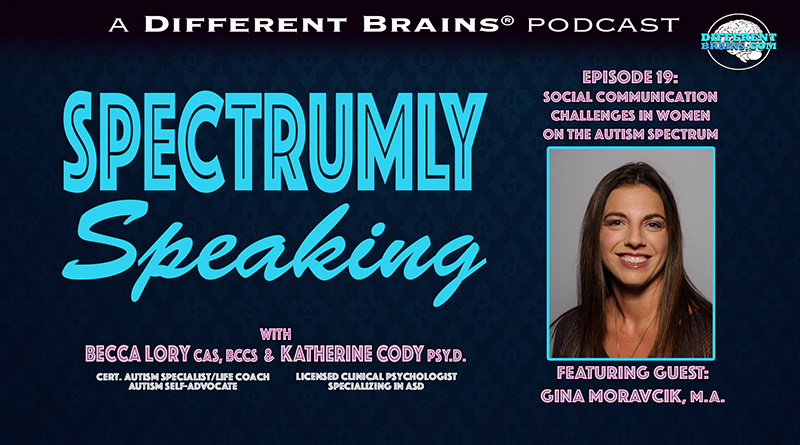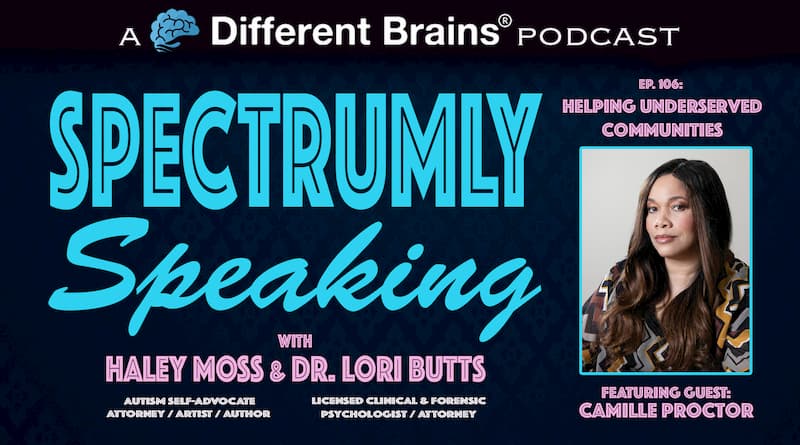
Voting! | Spectrumly Speaking ep. 98
Spectrumly Speaking is also available on: Apple Podcasts | Stitcher | SoundCloud
IN THIS WEEK’S EPISODE:
IN ADVANCE OF THE 2022 ELECTIONS WE WANT TO RE-SHARE THIS EPISODE!
(AUDIO – 17 minutes) In this episode, hosts Haley Moss and Dr. Lori Butts discuss voting, and offer tips for reducing stress and being informed.
Resources mentioned:
Spectrumly Speaking is the podcast dedicated to women on the autism spectrum, produced by Different Brains®. Every other week, join our hosts Haley Moss (an autism self-advocate, attorney, artist, and author) and Dr. Lori Butts (a licensed clinical and forensic psychologist, and licensed attorney) as they discuss topics and news stories, share personal stories, and interview some of the most fascinating voices from the autism community.
For more about Haley, check out her website: haleymoss.net And look for her on Twitter: twitter.com/haleymossart For more about Dr. Butts, check out her website: cfiexperts.com
Have a question or story for us? E-mail us at SpectrumlySpeaking@gmail.com
CLICK HERE FOR PREVIOUS EPISODES
EPISODE TRANSCRIPTION:
HALEY MOSS (HM): Hello and welcome to Spectrumly Speaking. I’m Haley Moss, an attorney, artist, author and I’m autistic. And I am joined here as usual, by our favorite co-host, the one and only…
DR LORI BUTTS (LB): [Laughs.] Dr. Lori Butts. You’re the best. I’m a psychologist and an attorney.
HM: You’re the best.
LB: How are you doing?
HM: Doing good.
LB: Good, are getting productive. That’s the most important question. Are you being productive?
HM: I am. So, I’m working on a book right now as well. And I’m coming up to a manuscript deadline. So, I’m really excited about that. It’s neurodiversity for lawyers. Very, very excited. Probably will end up asking you some questions about it another time.
LB: Yea sure.
HM: Because I’m just really excited to make lawyers be better at understanding people who are neurodivergent, including our colleagues.
LB: Right. It’s really important. It’s really, it’s important for lawyers. It’s important for judges. It’s important for law enforcement officers.
HM: I really want to think about it more when it comes to judges. That’s something I’m trying to flush out right now, because I don’t really have a lot of those answers.
LB: If you haven’t, if you need any help, you know you can call me so…
HM: I probably will! So, today we’re shifting gears a little bit. We’re going guestless, and most of you who have been around for guestless episodes usually know that they feel like therapy sessions between me and Dr. Butts that you all get to listen into. But today is not one of those days. We’re having a very important conversation with all of you about voting.
LB: Very important conversation.
HM: So, no matter which candidates you feel for whether it’s at the presidential level or down ballot, which basically means your congressional folks, the people who represent you on a city or county commission, mayors, judges, state attorneys, all sorts of other roles. Your vote matters and impacts not only our country, but also where you live.
LB: Absolutely. It’s very important.
HM: Something else super important to mention is that voting can be a barrier for people with disabilities and autistic people alike. You are eligible to vote.
It’s important to be able to exercise your vote however you can and get that done in an accessible way. I don’t know, for you especially, how voting is easiest. I mean I voted both through the mail and in person in my lifetime. I’ve made a point to vote in every presidential election that I’ve been able to vote for. I’ve only missed one local election my entire voting career.
LB: Wow! That’s great.
HM: Because I feel very strongly about it. And I didn’t, the only reason I missed an election is because I didn’t realize how to change my voter Reg when I came home from college, and I didn’t know how to request an absentee ballot. And given that with the Coronavirus this year, it’s really important to know how to do that for a lot of folks who might not feel comfortable going to vote in person.
LB: Yes. I’ve been voting for a very long time as I’m a lot older than you and, and I’ve been voting, we both of in Florida, I’ve been voting absentee for the past, probably,
10 years, which is means a mail-in vote. And for me, the reason why I shifted to that is it gives me more time and it’s less stressful, and I’m a neuro typical person. But there was one presidential election, and the line was, oh, it was the hanging Chad one. The line was so long to vote, and then I would, before all of the craziness of the election, it was what, Bush v. Gore. I left the ballot box when we had those Chads and I said to myself, “You know what? I’m not sure if I voted correctly.” And that really, really scared me. And then all of the litigation happened, and it was, so after that, I said, you know, I want to vote at home where I can take my time. I could do my research. I know that I’m doing it properly. I don’t feel rushed because there’s a lot of people behind me. And now with the Coronavirus it’s a whole new, you know, another set of circumstances, but I strongly recommend for everybody, because then you have your you could have documents in, especially when they have…
HM: And you can research your candidates as well.
LB: Exactly.
HM: Like in live time, especially if like remembering details at the booth might be difficult, where you can take all sorts of other materials with you other than getting accommodations, which you’re entitled to get by the way.
LB: Right, right, and you are entitled to do it, but it’s just, it’s just a more stressful environment before the pandemic just because there’s a lot of people around and you feel the pressure of not wanting to take up so much time at your, at the ballot, you know, at the spot where they give you and you just so, I’ve always been an advocate of voting at home so you can take your time, take however much time you need. Sometimes it takes a couple hours!
HM: Absolutely.
LB: So that’s and now with the pandemic. That’s, that’s even more important I think for our listeners.
HM: Exactly. And something really interesting, and I really like to bring this up, especially because we are an Autism podcast, for the most part too, is that disability issues take a spotlight at nearly every election. Whether or not you know it. So, whether it’s about health care or disability policy, or all issues or disability issues that affect you. And people with disabilities are a very large population here in the United States. And often times they are a group that can decide elections because
they’re pretty politically active, and it’s a very big swing voting bloc. So, there’s all sorts of really interesting data on this from respectability. And if you’re interested in finding out more information and you’re politically active and want to learn more about the disability community, voting, politics and elections. I highly recommend checking out the hashtag #CripTheVote. #CripTheVote is nonpartisan.
LB: How do you spell it?
HM:C.R.I.P the vote.
LB: Okay, thank you!
HM: And it’s hosted by disabled folks. It’s, sometimes you get candidates that at the national level, so a couple of the Democratic primary challengers appeared on it to answer questions from the community. And it’s a great way to also learn kind of what’s going on in disability policy, disability politics, which candidates might be catering to our communities, if there are certain platforms and initiatives that are important to us, and also things like voter accessibility. So I like to bring that up is as something if you’re really into the political discourse.
LB: Or even if you’re not, it sounds very accessible if you’re not in the political discourse to get yourself educated about what’s happening. I mean, you don’t have to, you know, be lawyers like we are and, and, you know, know all the specialized information we know, but it’s…
HM: Exactly and I know on the ballot not everything makes sense. So, I remember a few years ago we had Florida constitutional amendments, and even as a lawyer, I need some of them explained to me by our local newspaper, for instance.
LB: I did too. I did too. And I’d read these constitutional amendments 10 to 20 times. I’m a psychologist. I have two doctorates and I still don’t understand what it’s saying, and I get so frustrated because I’m like, how, if I don’t understand it, how, how does anybody else read this and understand what it means. So, it’s very, those constitutional amendments in Florida for those of you outside of Florida, maybe, who don’t have that experience, but…
HM: We get them every 10 years or so.
LB: And they’re, they’re very…
HM: And they pack a lot of different stuff into them. So, there was one like about like crime, but that the same time they’re also like loading in solar panels or something.
LB: Right. And there’s a lot of double negatives and what you think you’re voting for it, tends to be the opposite of what you want. So, that’s why research and understanding is so important, it’s so important.
HM: So, I think for most folks, because, even if they don’t know what they’re voting for, it’s like, “How do I vote?”
LB: Right
HM: And something I recommend, and this is something that I saw begin actually originally couple years ago, as like a meme or, like a challenge for your friends is coming up with a voting plan. So, you’d ask yourself these questions like, “How am I going to vote? Am I going to vote absentee, or by mail? Am I going to go in person? What should I bring with me? What do I need?” So, there is a great tool kit that we’ve been talking, we’ve been kind of mentioning without really mentioning from the autistic self-advocacy network about voting. There’s also a plain language version. So, again, we had a wonderful conversation on the show a few weeks ago about plain language. So, voting could be accessible to everybody who wants to learn. So, knowing where to go, what to bring with you, try to spare some of that anxiety. And then, of course, if you can try to challenge somebody that you know to vote is well if they’re able to.
LB: And bring everybody in your family. So, what happens in my family is, we have a group chat, and everyone reminds everybody to vote. And when you vote by mail, at least in my municipality, once you send it in, you can go online and check to make sure, A: that it was delivered and B: that it was accepted. Because, you know, sometimes they won’t accept it, if they say, if somebody looks at it, and says that your signature is not the same as the one that they have on file, and so if you vote ahead of time you can go online and check to make sure that it’s been accepted. And if it’s been rejected, you can go in person. And at least in in Florida, we have early voting as well.
HM: I used to do early voting because it was always less crowded.
LB: It’s less crowded, exactly. And again, you don’t have that pressure of a long line of all the people and all the stimulation of everybody around you. And so early voting, when early voting opens, you can go and there’s, there’s less people. There’s less interaction with people and there’s less pressure and you can take your time.
HM: Absolutely. And if you are a new voter, and you want to register to vote for the very first time, check like your state and local election officials to make sure that you don’t miss those very important deadlines to get registered. And if you’re requesting an absentee ballot to make sure that you need the deadline to do so.
LB: Right. Right.
HM: So, I know that sometimes I get, I think ours get mailed out sometime in October, not 100% sure on that but, and of course, send them back in a timely fashion so that your vote can be counted.
LB: Exactly.
HM: Do you have any other excellent recommendations for us? Because I know voting can be stressful. Like when we mentioned in person voting. I went on Election day for the first time in college. It was my very first election. I didn’t know early voting existed. And I remember standing in line at the student union for two hours to vote. And I was so proud of myself and I said, I will never do this again because to stand in line. And then I’m like, “Oh, I could go to early voting. I could do this like absentee if I wanted to as well like, wow!”
LB: Right, right.
HM: Also, it’s also really important to some of you might have moved during the pandemic. So, I’m back at my parents, and they’re not in the same county so I had to request an absentee ballot to be sent to my parent’s house, rather than to my registered voting address, for instance. So, see where you’re, if you’re currently registered, and you moved try to update it or request an absentee ballot accordingly.
Just kind of a fun thought, because I know if I requested an absentee without noting that it would have been sitting in my mailbox.
LB: Right, right. I mean, it’s all these things that you’ve got to think about and plan ahead of time. That’s the most important piece. But if you don’t if you don’t get an absentee, and you don’t do that ahead of time. I strongly suggest doing it early. Early voting means you can go, you know, usually it’s a week or two before. They’re centralized. It’s not every poll location. They’ll be like centralized polling places where you can go so you don’t have to miss work. And you don’t have to, you know, you can go at your leisure, but make sure you’ve got a mask. Make sure you got hand sanitizer. Make sure you have your identification and make sure that you have, you’ve prepared to know who the candidates are, who you’re going to choose. A lot of, I think most ballots, are online. You can, you can see the ballot ahead of time before you go in. And so, you can, I mean, you could go in with kind of a printout of your, your choices and just walk in and just carbon copy your choices onto the ballot that they give you there. And that may be one kind of easy way, like, so you’re not trying to do research on the fly while you’re in the ballot booth or, you know, at the station. Just bring in a mach one, and then just carbon copy it onto the onto the new one. And make sure you don’t make any mistakes in transcribing that information
HM: That is really smart.
LB: Those are, those are all really important components. There are a lot of countries where they don’t have the privilege or the rights of vote and it’s a sacred, it’s, it’s a very important piece of our democracy that everybody’s voice is heard, and this is really important as a citizen to take seriously, no matter what’s happening in the world.
HM: Exactly, and it’s not even just about who’s running for president. And I know people that won’t vote because they say, “Well, I don’t care because I don’t like either of the candidates.” But again, I always like to reinforce that what happens at the local level is more likely to affect you on the day to day basis, no matter who you are, what party you vote for, so definitely check about, you know, your local candidates because those people make a difference in your everyday life and your policies. So, whether it’s an extra penny tax or what day your garbage gets picked up. There is all sorts of little things that because of a local election, especially can
affect you and you might end up with choices that you don’t like if your voice is it heard. And there are some really wonderful folks who do care about our cities and our counties and our states. So, there’s all sorts of wonderful people and candidates and people who really want to make where we live better. So, it’s really important to understand that it’s not just about who’s going to be president or who’s going to serve you in Congress.
LB: Right. And these votes get decided on really small margins, especially the local ones, and every, your vote does count. Your voice counts. And this is the way you can exercise your voice. And this is how you could be heard. And especially if, if you, if you check in with your family members and you check in with your friends.
And make sure everybody’s held accountable, that everybody’s voting, and they’re doing their part. This is, you know, what we all need to be doing as citizens so that every voice is heard.
HM: Absolutely! And I think ending on that note of making sure that your voice is heard. Be sure to check with your local and state election officials to make sure you don’t miss any important deadlines. Register if you haven’t. It’s a very empowering thing to use your voice to vote. And to help have an outcome in democracy like Dr. Butts said, that not every place in the world has it, and it’s a huge privilege in exercising your rights. It’s really something I know I value and it’s a huge step towards independence, especially for those of us with disabilities who feel that we’re often silenced, or unheard or other people are speaking on our behalf. So, for me, voting is a chance to use and amplify my voice, and I really do appreciate that.
So, I think that’s really important for those of you who are self-advocates, or disabled yourselves, or neurodivergent, that your voice especially counts at that level of democracy, and that’s something really special. So, I hope that we will also link to some of these wonderful resources to help get you all ready for voting. And to learn more and of course, to keep up with us. Be sure to check out DifferentBrains.org and don’t forget to check out their Twitter and Instagram @diffbrains and look for them on Facebook as well. If you’re looking for me, I’m sure that as the elections get closer, I will also be sharing voter information and also be using the hashtag #CripTheVote to help inform a little bit more about disability policy and disability related voting issues and discourse. You can find me om Facebook, Twitter, and Instagram @ HaleyMossArt and you can find me on my website at HaleyMoss.Net.
LB: And I could be found at CFIexperts.com. Please be sure to subscribe and rate us on iTunes, and don’t hesitate to send questions to SpectrumlySpeaking@gmail.com. Let’s keep the conversation going!

Spectrumly Speaking is the podcast dedicated to women on the autism spectrum, produced by Different Brains®. Every other week, join our hosts Haley Moss (an autism self-advocate, attorney, artist, and author) and Dr. Lori Butts (a licensed clinical and forensic psychologist, and licensed attorney) as they discuss topics and news stories, share personal stories, and interview some of the most fascinating voices from the autism community.




